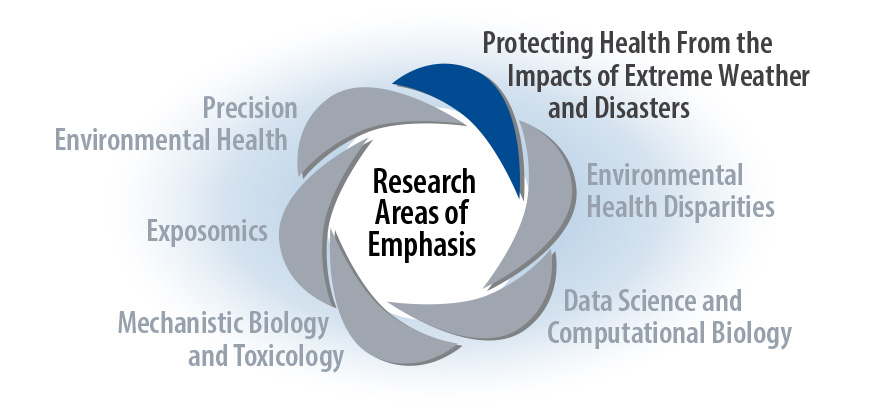Research Areas of Emphasis

Extreme weather events including record-breaking heat, storms, and droughts, create increased risk of outcomes including floods, wildfires, and the spread of vector-borne diseases that in turn can compromise human health. The need to understand and both prepare for and respond effectively to such disasters is increasingly urgent. NIEHS brings to this challenge decades of research on the impacts of environmental factors on human health. Such research is being leveraged to uncover the myriad ways in which extremes and disruptions of the natural systems humans rely on for air, water, food, shelter, and other essentials affect risks to the infrastructures, economies, and other systems of communities, all of which impact health. We know that these impacts do not threaten all communities or groups the same way. For example, the health of children, those with pre-existing chronic conditions, older adults, and those experiencing additional stressors, such as poverty, limited access to healthcare, or poor housing conditions, may be more at risk from these disasters.
NIEHS provides leadership in this area by coordinating NIH efforts to support research, translation, capacity, and training aimed at more fully understanding the direct and indirect impacts of extreme weather and disasters on the health of communities across America. Addressing knowledge gaps in topics such as the impacts of heat on maternal and worker health, weather changes that increase disease risks, exacerbation of respiratory and other ailments from wildfire smoke, and more, will provide information that can be used for preventative health measures, preparedness, and solutions to save lives and improve quality of life for those affected by natural disasters, extreme weather conditions, and emerging environmental harms. Such research will use new approaches for using and integrating geophysical and health data to inform the identification of trends, prediction of risks, and adoption of actions to prevent and respond to negative health outcomes, thereby empowering communities to adapt and build resilience against such threats.
Translational Goal
Catalyze research and translation of extreme weather effects on human health to reduce related health threats and impacts, especially among those most at-risk, and build health resilience among individuals and communities.
Priority Approaches
- Provide leadership, guidance, technical assistance, coordination, and other resources to spur environmental health research and support protecting health from impacts of disasters and extreme weather.
- Conduct and support collaborative research with other NIH institutes, centers, and offices that combine biomedical and geophysical data to fill gaps in our understanding of human health and the causes of diseases and health conditions.
- Build partnerships that facilitate the translation of research across many sectors to provide the evidence base for health-protective policy and decision-making on health.
- Develop and sustain research, communication, resources, decision support tools, and knowledge bases to support action on extreme weather events, disasters, and health, and related areas.
Other Strategic Plan Sections

Crosscutting Themes
NIEHS is committed to collaborations and partnerships across its endeavors to successfully contribute to the critical work of NIEHS.

Capacity and Infrastructure
NIEHS research activities depend on robust investments in capacity and infrastructure to ensure readiness for their success.

Scientific Management and Stewardship
NIEHS prioritizes scientific stewardship and operational principles that align with the institute’s commitment to advancing human health and understanding the environment’s impacts on human health.


